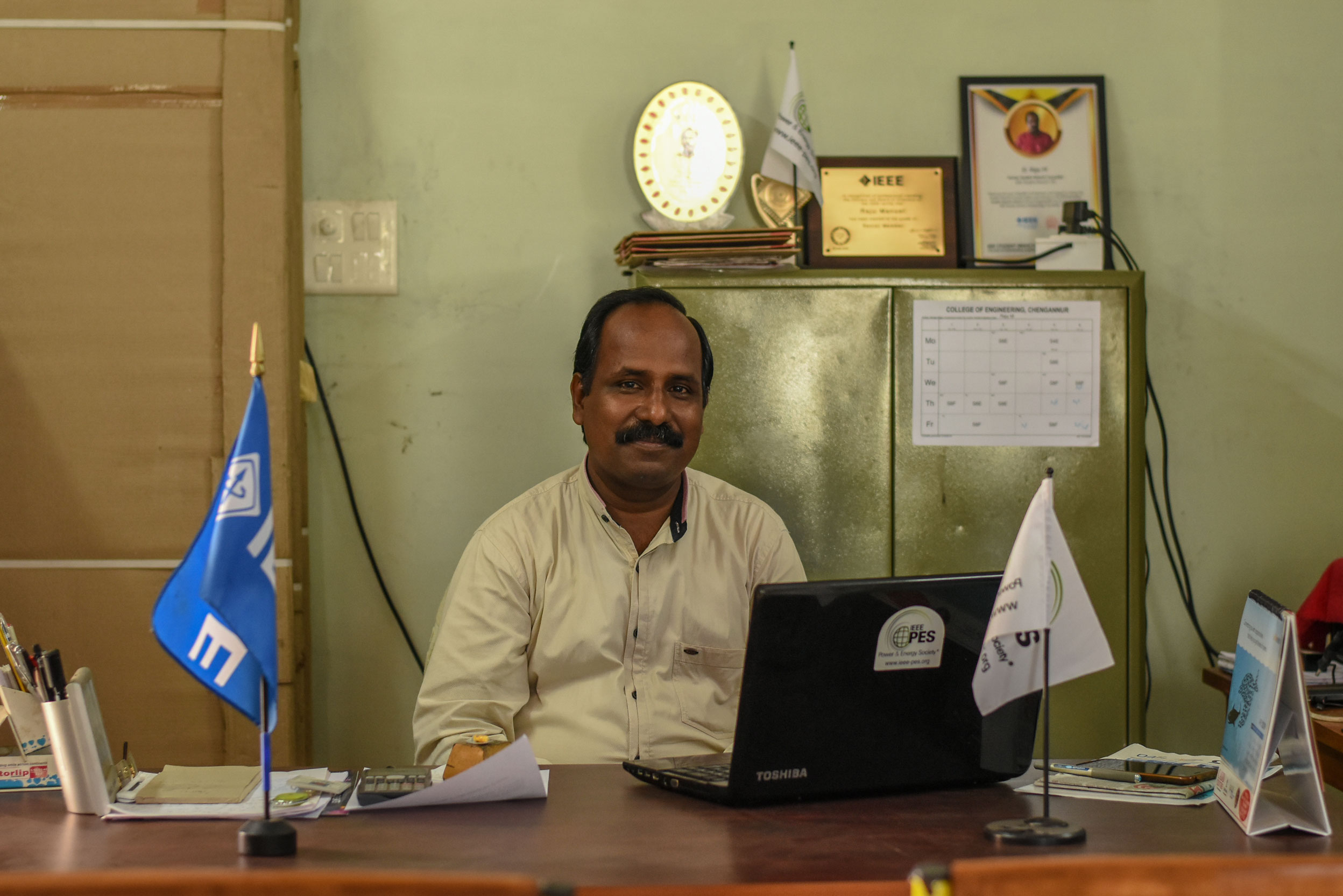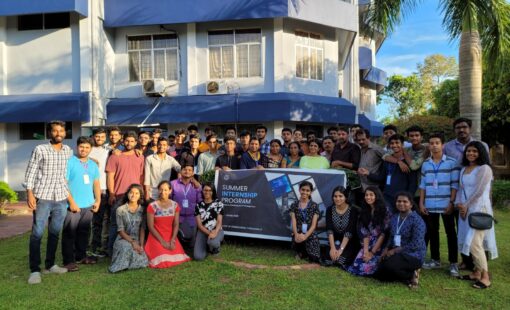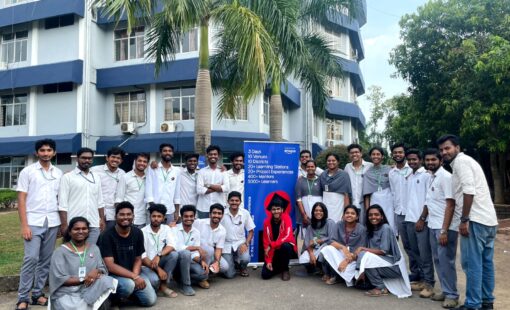Department of Electrical Engineering
About
The Department of Electrical Engineering was established in 2009. It offers B.Tech in Electrical and Electronics Engineering affiliated to APJ Abdul Kalam Technological University, Kerala, with a current sanctioned intake of 120. The department has a wealth of experienced faculty having their Masters and Doctoral degrees from premier institutions to give personalized attention to the students. The Department owns well equipped laboratories to meet the curriculum requirements. We aim at reshaping the objectives in education and training, so that the students can excel not alone in the field of Electrical engineering, but also in multidisciplinary areas as well, for their diversified career plans.
Vision
Evolve into a department of excellence in Electrical Engineering to serve the emerging society by nurturing the innovative, ethical and creative talents of aspiring young professionals
Mission
- M1. Foster a quality oriented academic environment to provide a comprehensive understanding of Electrical and Electronics Engineering.
- M2.Mould technically accomplished Electrical Engineers and Entrepreneurs through institute-industry interactions.
- M3. Equip the students with technical know-how, professionalism and social values.
Programmes Offered
| Programme | Duration |
|---|---|
| B.Tech in Electrical & Electronics Engineering | 4 years |
Facilities Offered
Electronic Circuits Lab
Facilitates experiments on various analog electronic circuits containing transistors, opamps etc. using CRO, DSO, power supplies, Function generator and other components.
Power Electronics & Drives Lab
Equipped with DSO, Various Power supplies, Function generators, PWM trainer kit, Rectifier trainer kits, Triac and Diac trainer kits for the conduct of experiments on power electronics circuits.
Microprocessor Lab
Equipped with 8085 and 8051 kits with keyboard interface and built-in assembler.
Electrical Machines Lab
Electrical machines lab is equipped with different types of DC motors, DC generators, Three phase Induction motors, Single phase induction motor, Induction generator, Synchronous motors, Alternators, Double cage induction motor, three phase and single phase transformers, Scott connected transformers, various types of loads and meters for conducting all types of performance tests.
Circuits and Measurements Lab
The electrical fundamental laws like KVL, KCL, Thevenin’s, Norton’s theorems, series & parallel RLC circuits etc. are verified & demonstrated on experimental platform. This lab is equipped with measuring instruments, rheostats, AC & DC bridges, capacitive, inductive & resistive loadings, earth resistance tester, energy meters, BH loop tracer etc.
Electrical Systems and Control Lab
Facilitates the conduct of experiments using Relay trainer kits, Synchro transmitter –receiver, PID trainer kit, AC & DC Servomotors, Strain Gauge Training Module, Stepper motor trainer kit, inductive & capacitive pickups etc. Also there are computer systems with Soft ware- ETAP installed.
Project Lab
The department has a well adequate project lab facility with all equipment needed to meet the curriculum requirements and to enhance overall learning experience. It is also equipped with computers and internet facility which makes it a self learning centre. Students can use the lab any time for their research and simulation purpose and Mini & Major project works. The lab also has the seating capacity of 50 with enough requirements to conduct seminars, smart classes and workshops. It has LAN connected 30 nodes of computers. Also there is LCD projector facility to engage simulation classes in this lab.
Dr. Raju M
Head of the Department
Department of Electrical Engineering
College of Engineering, Chengannur
Alappuzha (Dist.) – 689121
Faculty
| Sl.No. | Name | Designation |
|---|---|---|
| 1. | Dr. Rajeevan A K | Assistant Professor |
| 2. | Dr.Raju M | Assistant Professor & HOD |
| 3. | Smt. Haseena P Y | Assistant Professor |
| 4. | Smt.Sherin Joseph | Assistant Professor |
| 5. | Sri. Bijukumar K | Assistant Professor |
| 6. | Sri.Prasobh P | Assistant Professor |
| 7. | Smt. Aja Mariam Johnson | Assistant Professor |
| 8. | Smt. Anaswara Mohan | Assistant Professor |
| 9. | Smt.Devisree Sasi | Assistant Professor |
| 10. | Smt. Amrutha Anand | Assistant Professor |
| 11. | Smt. Preseetha Kuruvelil | Assistant Professor |
| 12. | Smt. Aneesha M S | Assistant Professor |
| 13. | Smt. Geethu Zacheria | Assistant Professor |
Technical Staff
| 1. | Sri. Benny Mathew V |
Foreman |
| 2. | Smt. Reshmimol P R |
Demonstrator |
| 3. | Smt. Arya P Krishnan |
Demonstrator |
| 4. | Sri Anil C D |
Tradesman |
| 5. | Sri. Abhinand R |
Tradesman |
| 6 | Sri. Jayakrishnan G |
Tradesman |
| 7. | Sri. Afzal H |
Tradesman |
Program specific outcomes and objectives
Program Outcomes (POs)
At the end of their course, Electrical Engineering Graduates will have achieved the following values and capabilities :
-
Engineering knowledge: Apply the knowledge of mathematics, science, engineering fundamentals, and an engineering specialization to the solution of complex engineering problems.
-
Problem analysis: Identify, formulate, review research literature, and analyze complex engineering problems reaching substantiated conclusions using first principles of mathematics, natural sciences, and engineering sciences.
-
Design/development of solutions: Design solutions for complex engineering problems and design system components or processes that meet the specified needs with appropriate consideration for the public health and safety, and the cultural, societal, and environmental considerations.
-
Conduct investigations of complex problems: Use research-based knowledge and research methods including design of experiments, analysis and interpretation of data, and synthesis of the information to provide valid conclusions.
-
Modern tool usage: Create, select, and apply appropriate techniques, resources, and modern engineering and IT tools including prediction and modeling to complex engineering activities with an understanding of the limitations.
-
The Engineer and Society: Apply reasoning informed by the contextual knowledge to assess societal, health, safety, legal and cultural issues and the consequent responsibilities relevant to the professional engineering practice.
-
Environment and sustainability: Understand the impact of the professional engineering solutions in societal and environmental contexts, and demonstrate the knowledge of, and need for sustainable development.
-
Ethics: Apply ethical principles and commit to professional ethics and responsibilities and norms of the engineering practice.
-
Individual and team work: Function effectively as an individual, and as a member or leader in diverse teams, and in multidisciplinary settings.
-
Communication: Communicate effectively on complex engineering activities with the engineering community and with society at large, such as, being able to comprehend and write effective reports and design documentation, make effective presentations, and give and receive clear instructions.
-
Project management and finance: Demonstrate knowledge and understanding of the engineering and management principles and apply these to one’s own work, as a member and leader in a team, to manage projects and in multidisciplinary environments.
-
Life-long learning: Recognize the need for, and have the preparation and ability to engage in independent and life-long learning in the broadest context of technological change.
Program Educational Objectives (PEOs)
PEO1: Technical Knowhow: Meet the requirements of industry and academia through their acquired technical knowledge and research skills.
PEO2: Innovation: Apply engineering skills to bring out innovative electrical/electronics products to enhance the quality of life. PEO3: Professional excellence: Exhibit professional excellence in diversified career paths to perform well in the competitive world. PEO4: Leadership Skills: Exhibit leadership qualities and ethical values to contribute for society and environment.
Program Specific Outcomes (PSOs)
1.Design and Analysis of electrical systems: Design and implement indigenous electrical and electronic systems through modeling and simulation.
2. Implementation of Power systems: Implement reliable and smart power and energy systems with appropriate optimization techniques.
3. Adherence to Standards: Students will design, estimate, implement and test electrical installations conforming to prevailing standards.
4.Adaptability: Adapt to technological changes and different working environments and cultures
Department News
‘Resonance’ is the department newsletter highlighting the latest trends in electrical engineering, including updates to practice standards and major events organized in the institution, especially by the Electrical Department. This is a free, biannual newsletter, published in every February and August.
The editorial board is led by faculty members with a team of student members in the various positions as :
Faculty in charge : Dr. Raju M & Smt. Sherin Joseph
Chief Editor : Julin Dann
Associate Editor : Ahalya A Kumar
Design : Sree Hari J B & Benjamin O T
The published issues are available through the following links:




